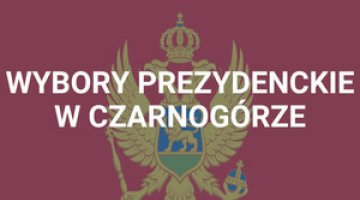Presidential elections in Montenegro: the end of the Djukanovic era
The second round of Montenegro’s presidential elections, held on 2 April, was won by Jakov Milatović, a co-founder of the Europe Now party. He won 60% of the vote, while his rival, the incumbent Milo Djukanović, received 40%. Turnout was 69%. Djukanović won in the first round (with 35% support), but the three challengers fielded by the ruling coalition – Milatović, Andrija Mandić and Aleksa Bečić – together garnered 58% of the vote. The latter two immediately transferred their support to Milatović, and appealed to their supporters to end Djukanović’s rule.
The incumbent president presented himself in the campaign as a guarantor of the country’s independence and its defender against Serbian and Russian influence. He also insisted that he was still committed to preserving the multi-ethnic and secular model of the state. Milatović, meanwhile, stressed the need to complete the changes begun after the 2020 parliamentary election, including accelerating European integration and fighting corruption. He is a 37-year-old economist, and served as economy and development minister from 2020 to 2022.
Montenegro’s fourth presidential election since it declared independence in 2006 took place in the midst of a protracted political crisis that has lasted since August 2022, when parliament passed a vote of no confidence in Dritan Abazović’s cabinet, which had been in office for less than four months. As it proved impossible to elect a new government, Djukanović dissolved parliament just before the first round of the presidential election, and called early elections for a new one on 11 June this year.
Commentary
- The election result marks the end of the era of Djukanovic, the longest-serving ruling politician in Europe. He has served as prime minister and president several times since the early 1990s, when Montenegro was still part of the Federal Republic of Yugoslavia, and continued to do so during the confederated state with Serbia; he also became prime minister and then president of independent Montenegro. Internationally, Djukanović is seen as the father of his country’s independence, during whose reign accession negotiations with the EU began (2012) and entry to NATO was finalised (2017). At the same time, his long period in power has been characterised by links between organised crime and the political & economic world. This period was also marked by the appropriation of public institutions and the emergence of conflicts with the Serbian Orthodox Church, to which nearly 70% of the country’s citizens belong (for more details, see ‘Growing pains. Montenegro after 16 years of independence’). The weakening of the monopoly held by Djukanović and his Democratic Party of Socialists of Montenegro (DPS) came to a head in August 2020, when the DPS was ousted from power by a broad coalition of opposition groups following parliamentary elections, and subsequently lost control over a number of local governments in several local elections. Milatović’s victory heralds the continuation of the generational change in Montenegrin politics that began in 2020. He belongs to the same generation as the current PM Abazović: they both have the reputation of being technocrats who graduated from Western universities.
- Djukanović’s defeat will not necessarily stabilise the political situation. The coalition which unseated him was mainly united by resentment toward him and his party’s long-standing rule, while at the same time it was characterised by a lack of political cohesion. The issues dividing them include differing attitudes toward identity and historical issues (some of it senior figures did not support the country’s declaration of independence from Serbia in 2006), as well as Montenegro’s foreign policy and relations with its neighbours, including Serbia. The unstable government has been accompanied by personnel disputes and resignation by the leaders of strategic ministries and key officials. The Djukanović-led DPS still enjoys support from a sizable group of voters which, if properly mobilised, could win more than 35% of the vote. The party will try to use the upcoming early elections as a kind of rematch with the ruling camp, and so will focus on the political instability which has plagued the country since 2020. Nevertheless, Milatović’s win, by nearly 20 percentage points, shows the ineffectiveness of the narrative pushed by the DPS and Djukanović, presenting them as creators and guarantors of the country’s independence, as ‘true patriots’ and guardians of European values. This narrative has fallen especially flat with younger generation, who want systemic changes in the country and are aware of the deficits of democracy which characterised the DPS’s time in power.
- There is unlikely to be any serious course correct in foreign policy after Djukanovic’s departure, although some adjustments should be expected. The country will probably retain its pro-Atlantic orientation and continue the process of European integration. However, any further progress depends on how it fights corruption and improves the efficiency of the judiciary. Podgorica will also maintain its political support for Ukraine. On the other hand, changes should be expected in bilateral relations with Serbia. Milatović has declared that it is a very important partner and Montenegro’s closest cultural neighbour. At the same time, it is possible that Podgorica will try to join the Open Balkan initiative, formed in 2021 by Serbia, Albania and North Macedonia, although no decisions on this issue will be taken until after the parliamentary elections. The new president’s image has been burdened by the media support given to him during the campaign by nationalist and pro-Russian circles in Serbia (including Vojislav Šešelj). However, it is possible that – like other activists in the ruling camp since 2020 – Milatović will limit the influence of radical and overtly pro-Serbian politicians, and adopt a pragmatic approach in international relations.



